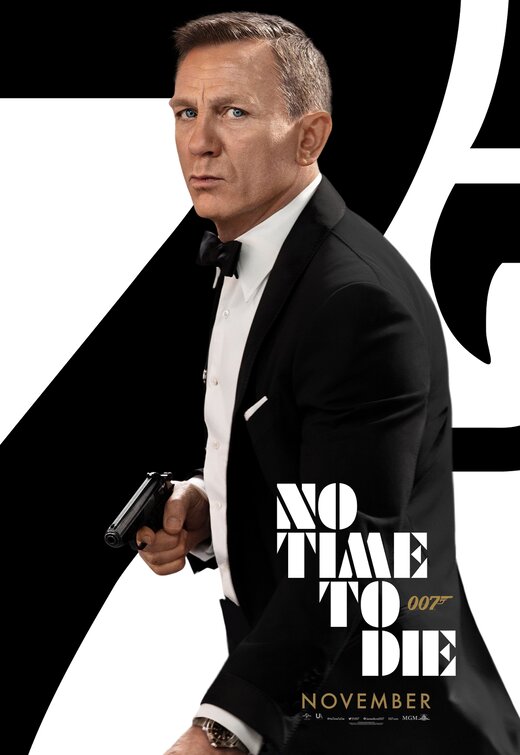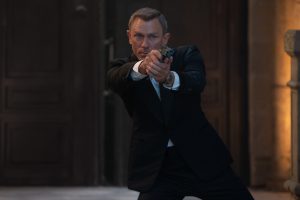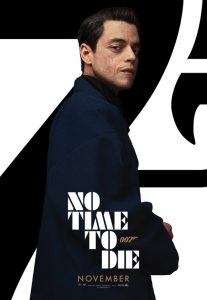Posts Tagged ‘Rory Kinnear’
The Heracles Project
No Time to Die

Director: Cary Jojo Fukunaga
Cast: Daniel Craig, Lea Seydoux, Rami Malik, Lashana Lynch, Naomie Harris, Ralph Fiennes, Ana de Armas, Christoph Waltz, Jeffrey Wright, Rory Kinnear, Billy Magnussen, Ben Whishaw, David Dencik, Dali Benssalah
Film Rating: 8.5 out of 10
Running time: 2 hours and 43 minutes
In the highly anticipated 25th Bond film which was delayed for 18 months due to the coronavirus pandemic, producers Barbara Broccoli and Michael G. Wilson were determined to wait until they could screen No Time to Die on cinema screens and their wish was granted.

Finally with the release of No Time to Die, all the original cast from Spectre are back plus some new additions including Ana de Armas (Knives Out, Blade Runner 2049) as Paloma, Lashana Lynch (Captain Marvel) as Nomi and the excellent Rami Malek as the villain Lyutsifer Safin. The sophisticated French actress Lea Seydoux (Spectre, The Grand Budapest Hotel) reprises her role back as Dr Madeleine Swann.

Oscar winner Rami Malik (Bohemian Rhapsody) relishes the role of Bond villain echoing Dr No, a psychotic megalomaniac who is violent and will stop at nothing for world domination. Naturally Lyutsifer Safin has his own private island in the disputed waters between Japan and Russia, a nod to You Only Live Twice.

Daniel Craig is brilliant in his fifth and final outing as James Bond navigating a shifting cultural and social world, representing in essence the sassy and glorious character of Noni wonderfully played by Lashana Lynch as we first glimpse them interact in a nightclub in Jamaica.

Ralph Fiennes is back as M, Naomie Harris and Ben Whishaw are also back as Moneypenny and Q respectively. Jeffrey Wright is back as CIA agent Felix Leiter. All the usual suspects appear.

Without revealing any of the complex and protracted plot, containing some massive surprises, No Time to Die is an impressive Bond film, slightly weighty in the middle but cinematically perfect with crisp production design by Mark Tildesley and gorgeous cinematorgraphy by Linus Sandgren.

As the action moves around the globe, from Italy to the tropical beaches of Jamaica to Norway and then to the Safin’s futuristic lair on a disputed island which is clearly inspired by Blade Runner 2049, No Time to Die will simultaneously keep Bond fans in awe and frustrate those that have been loyal to the franchise since its original inception back in 1962 with Dr No. So much has changed.

No Time To Die is a very long film, running at 2 hours and 43 minutes but it’s worth seeing for the glorious scenery, the unbelievable stunt sequences and the amazing plot twists while the screenwriters pay homage to many of the previous Bond films and even transcending the 007 franchise and updating the technology to the 2020’s.

What remains to be seen is where will the franchise go from here?

Beautifully directed by Cary Jojo Fukunaga, No Time to Die is a technically brilliant film with an amazing international cast which will keep audiences literally on the edge of their seat. No spoilers were revealed, so viewers just go and find out what all the fuss is about.

No Time to Die gets a film rating of 8.5 out of 10 and is highly recommended viewing.
Killers and Liars
Spectre
Director: Sam Mendes
Cast: Daniel Craig, Lea Seydoux, Christoph Waltz, Naomie Harris, Monica Bellucci, Ben Whishaw, Ralph Fiennes, Rory Kinnear, Dave Bautista, Andrew Scott, Jesper Christensen
British director Sam Mendes follows up his 2012 blockbuster Skyfall, with the 24th installment of the 007 franchise aptly named Spectre, which serves as a pastiche of all previous Bond films, but particularly referencing Casino Royale, Quantum of Solace and Skyfall.
With a truly spectacular opening sequence shot during the Day of the Dead festival in the sprawling and crowded central plaza of Mexico City, Spectre promises better and bigger cinematic moments. On all accounts, Spectre delivers although at times, the Bond film could have been more tightly edited.
The action sequences in Mexico City, Rome and Tangier are gripping and the production design and cinematography are quite startling, shading the film between sequences of extreme illumination and murky darkness in keeping with the sinister undertone pervading the entire narrative.
Mexico City and Tangier are beautifully done, with gorgeous colours contrasting against the monochromatic elegance of the Roman streets at midnight or the snow covered Austrian Alps during ski season.
The Tangier scenes are clearly influenced by Bernardo Bertolucci’s classic film, The Sheltering Sky, especially when Bond and Dr Swann disembark from the Moroccan train into a sweltering Saharan desert, while the previous action on board mirrors that of The Spy Who Loves Me. Audiences should watch out for Dave Bautista (Guardians of the Galaxy) as the Spectre henchman Mr Hinx who has a penchant for popping a man’s eyes out with his thumb nails.
Daniel Craig returns as James Bond looking slightly weary and a tad less nimble but nevertheless maintaining a smirk on his face along with those dazzling blue eyes. In a stroke of genius casting, French actress Lea Seydoux is brilliant as Dr Madeleine Swann, daughter of the Pale King, whilst the villain is suitably menacing and at times slightly camp, Franz Oberholzer better known as the evil mastermind with a penchant for white Persian cats, last seen in You Only Live Twice, On Her Majesty’s Secret Service and Diamonds are Forever.
Naturally, Oscar winner Christoph Waltz (Inglourious Basterds, Django Unchained) is fabulous as Bond’s crazed arch enemy, but somehow does not make as brilliant an impression as Javier Bardem did as Raoul Silva in Skyfall.
With the absence of Judi Dench as M, Ralph Fiennes, appears craggy and irritable as the new M, reminiscent of the original M in the 1960’s Bond films. Refreshingly, Naomie Harris as Moneypenny and Ben Whishaw as the technically gifted Q have bigger roles in Spectre, acting always as Bond’s necessary sidekicks. Watch out for a brief but glamourous cameo by Monica Bellucci as Lucia Sciarra and Jesper Christensen as the ubiquitous Mr White, last seen in Quantum of Solace.
Spectre, which stands for the Special Executive for Counter-intelligence, Terrorism, Revenge and Extortion is subtly portrayed as a pervasive and dangerous shadow organisation responsible for all sorts of international atrocities, which in the 21st century is particularly apt. As the visual references abound throughout Mendes’s Spectre, it will only be the serious Bond fans that will spot all those cinematic clues. In this respect, Spectre pays tribute to the success of the longest running film franchise ever, without undermining its inherent and enduring appeal.
Spectre is highly recommended viewing for ardent Bond fans, although some might find this film slightly long and the narrative muddled, but then again, one has to identify all the past 007 signifiers, for Spectre to be truly appreciated.
The question remains, much like the creepy opening sequence, is there life after Spectre?
29 Million Variations
The Imitation Game
Director: Morten Tyldum
Cast: Benedict Cumberbatch, Keira Knightley, Matthew Goode, Charles Dance, Rory Kinnear, Alan Leech, Tom Goodman-Hill, Matthew Beard, James Northcote, Steven Waddington
Based upon the 1983 book by Andrew Hodges, Alan Turing: The Enigma and brilliantly adapted into an insightful screenplay by Graham Moore, The Imitation Game is a superb and evocative historical drama about the breaking of the enigma code at Bletchley Park during World War II.
Norwegian director Morten Tyldum elegantly weaves a very touching and tragic story of espionage, cryptography and sexuality extracting nuanced performances out of Benedict Cumberbatch as Turing and Keira Knightley as Joan Clarke, an odd couple who make up the mysterious collective which work on and break the seemingly impossible Nazi enigma code at the height of World War II. Using real war footage and blending in a fascinating portrayal of the mathematician Alan Turing whose genius has only recently been acknowledged.
Set between the years of 1928 and 1951, The Imitation Game paints a moving portrait of a very complicated man, whose brilliance was only threatened by the inherent violence of war which engulfed England during the 1940’s as well as the prejudice which followed regarding his latent homosexuality in the early 1950’s.
Cambridge mathematician graduate whose thesis was entitled the Imitation Game, Alan Turing was socially awkward, shy, bullied at an English prep school but the perfect sort of individual who had the foresight and intelligence to develop a machine which cracked the seemingly unbreakable enigma code, a daily Nazi signal which gave countless GPS co-ordinates of where they would be bombing next during World War II with a minimum of 29 million variations.
Naturally groomed by the newly formed MI6 by Stewart Menzies wonderfully played by Mark Strong, Turing is recognized for his potential and yet later vilified for his own sexuality in a moving portrait of one the 20th century’s biggest injustices, his charge and subsequent punishment of chemical castration for being homosexual in 1952, when it was still criminalized in Great Britain.
This was despite the fact that Turing’s mathematical brilliance was the reason that the complicated machine which he called Christopher named after a schoolboy crush, manages to decipher this seemingly unbreakable code able to break the Nazi code and prevent World War II from continuing beyond 1945.
Historically there were lots of other reasons the War ended when it did, but The Imitation Game focuses on the people behind the scenes, the cryptanalysts and code-breaking who elusively assisted those fighting on the front line.
Widely regarded as the founding father of theoretical computer science Alan Turing’s life story http://en.wikipedia.org/wiki/Alan_Turing has only recently gained prominence following a Royal pardon and a highly publicized internet campaign to clear Turing’s name and bestow upon him the recognition he never received in his own lifetime.
With a suitably moving musical score by Alexandre Desplat, The Imitation Game is a poignant and superb historical drama of Turing and his band of men and one woman, Joan Clarke, featuring one of the best performances by Knightley (Atonement, Anna Karenina) in a race against time to save the world from tyranny. Turing’s genius as a mathematician came at a price, his apparent lack of emotional empathy yet despite the enormity of his task, he remained ironically detached from the brutal war which engulfed Europe and the world around him.
The Imitation Game is an intelligent historical drama, with universal themes of injustice and perseverance despite the prejudice and the odds against infuriating bureaucracy and time itself. Highly recommended for those viewers that enjoyed Atonement and Another Country.






